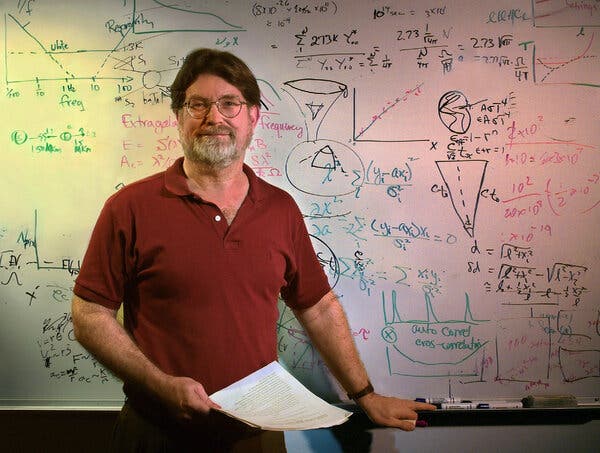Science
Celebrated Physicist George F. Smoot Passes Away at 80

Renowned physicist and Nobel laureate George F. Smoot passed away on September 18, 2023, at his home in Paris. He was 80 years old. His sister, Sharon Bowie, confirmed that he died from cardiac arrest. Smoot was pivotal in advancing our understanding of the universe’s origins, specifically through his work on the Cosmic Background Explorer (COBE) satellite.
During his tenure at the Lawrence Berkeley National Laboratory and the Space Sciences Laboratory at the University of California, Berkeley, Dr. Smoot led a team that created a detailed image of the early universe using technology he developed in the 1970s. Launched in 1989, COBE detected minute temperature variations in the cosmic microwave background radiation, remnants from what is widely believed to be the Big Bang.
Dr. Smoot’s groundbreaking findings were publicly announced in 1992 at an American Physical Society conference, capturing global attention. He famously remarked, “If you’re religious, it’s like seeing God,” when discussing the implications of the data collected. This profound discovery was heralded by theoretical physicist Stephen Hawking as potentially “the greatest discovery of the century, if not of all time.”
Transforming Cosmology Through Data
Before Dr. Smoot’s work, cosmology was primarily speculative, lacking substantial data. His research built upon earlier discoveries made by physicists Arno A. Penzias and Robert W. Wilson, who in 1964 identified the existence of the cosmic microwave background. These findings provided solid evidence that the universe had a beginning and had expanded dramatically from a singular point.
The COBE satellite’s measurements provided a wealth of data that helped scientists test various theories about the universe’s composition and evolution. Dr. Smoot shared the 2006 Nobel Prize in Physics with John C. Mather, recognizing their contributions to the COBE project. Each was a leader in the mission, which solidified the link between the cosmic microwave background and the Big Bang.
Despite his accolades, Dr. Smoot faced scrutiny from some colleagues who believed he received undue credit for collaborative achievements. Just days before the pivotal conference in 1992, a news release from Berkeley Lab was perceived to overly credit Smoot while neglecting other contributors to the project, including NASA.
Legacy and Public Engagement
Born on February 20, 1945, in Yukon, Florida, Dr. Smoot’s passion for science was nurtured by his mother, a teacher, and his father, a hydrologist. After earning degrees in physics and mathematics from the Massachusetts Institute of Technology, he completed his Ph.D. in particle physics in 1970 at Berkeley, where he shifted his focus to cosmology.
His early work included developing instruments to measure cosmic microwave background temperature variations, leading to groundbreaking discoveries about the Milky Way’s movement through space. In 1974, he proposed a NASA mission to send his instruments into orbit, which eventually culminated in the COBE project.
Dr. Smoot’s contributions to cosmology extended beyond research. He became a professor at Berkeley in 1994 and founded the Berkeley Center for Cosmological Physics, using his Nobel Prize funds to support educational initiatives. He was involved in establishing cosmology institutes globally and was elected to prestigious organizations, including the National Academy of Sciences.
In later years, he engaged in science outreach, creating educational programs for high school teachers and students. He taught an online course on gravity that attracted over 87,000 participants and made guest appearances on popular television shows, including The Big Bang Theory. Notably, he participated in the game show Are You Smarter Than a Fifth Grader?, winning $1 million, which he dedicated to scholarships for aspiring scientists.
Dr. Smoot is survived by his partner, Nóra Csiszár, and his legacy will endure through his contributions to science and education. His work not only expanded our understanding of the universe’s origins but also inspired countless individuals to pursue careers in science.
-

 Science2 weeks ago
Science2 weeks agoIROS 2025 to Showcase Cutting-Edge Robotics Innovations in China
-

 Politics2 weeks ago
Politics2 weeks agoJudge Considers Dismissal of Chelsea Housing Case Citing AI Flaws
-

 World2 weeks ago
World2 weeks agoBravo Company Veterans Honored with Bronze Medals After 56 Years
-

 Lifestyle2 weeks ago
Lifestyle2 weeks agoStone Island’s Logo Worn by Extremists Sparks Brand Dilemma
-

 Top Stories2 weeks ago
Top Stories2 weeks agoIndonesia Suspends 27,000 Bank Accounts in Online Gambling Crackdown
-

 Health2 weeks ago
Health2 weeks agoStartup Liberate Bio Secures $31 Million for Next-Gen Therapies
-

 Sports2 weeks ago
Sports2 weeks agoMel Kiper Jr. Reveals Top 25 Prospects for 2026 NFL Draft
-

 Health2 weeks ago
Health2 weeks agoTop Hyaluronic Acid Serums for Radiant Skin in 2025
-

 World2 weeks ago
World2 weeks agoHoneywell Predicts Record Demand for Business Jets Over Next Decade
-

 Sports2 weeks ago
Sports2 weeks agoYamamoto’s Mastery Leads Dodgers to 5-1 Victory in NLCS Game 2
-

 Politics2 weeks ago
Politics2 weeks agoNew Jersey Voters Urged to Register Ahead of November Election
-

 Lifestyle2 weeks ago
Lifestyle2 weeks agoMary Morgan Jackson Crowned Little Miss National Peanut Festival 2025









